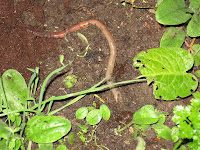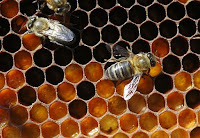As I turned the corner onto the street where I live, I was pleased to see that the problem had been taken care of by some obliging, non-human animals: Four vultures were by the street's curb, two of them picking at what little was left of the corpse. The nicely-designed hooks on the tips of their beaks enabled them to easily tear off bite-sized pieces of meat.
I was struck by the contrast between my previously anxious mind about how to solve a problem and the relaxed casualness of the vultures. They reminded me of a group of human diners at a Chinese restaurant who, after sharing a large meal, are in no hurry to leave, and so enjoy lingering together. Two of them were still nibbling, while the other two lingered with the nibblers.
I do not know where the four vultures had been residing before they spotted the dead opossum. But my appreciating how obliging they were in solving my clean-up problem led to my recalling the mob of flies that had been swarming around the corpse a few hours earlier. Although distasteful to me, they too had been beginning Nature's disposal of the dead animal, even if in a much slower fashion.
How numerous are the species of animals that obligingly help us humans! (And here I am thinking of animals other than those who are coerced into becoming meat on our dinner plates.) Such animals as bees that make honey, some of which we snitch. And the many kinds of other insects that pollinate our fruit and nut trees. Also, the earthworms that help rejuvenate the life-giving soil. The list goes on at length.
 Flies. Vultures. Bees. Insects. Worms. These are all among the "Living Things We Love to Hate," as Des Kennedy expresses it in his book's title. Nevertheless, such obliging animals, going about their own business, make our human work, recreation, and even lives possible. We can be thankful for that.
Flies. Vultures. Bees. Insects. Worms. These are all among the "Living Things We Love to Hate," as Des Kennedy expresses it in his book's title. Nevertheless, such obliging animals, going about their own business, make our human work, recreation, and even lives possible. We can be thankful for that.
~ ~ ~
Can you think of any other animals that help us in easily overlooked ways?
(The book mentioned is Living Things We Love to Hate: Facts, Fantasies & Fallacies by Des Kennedy, © 1992, 2002.)

